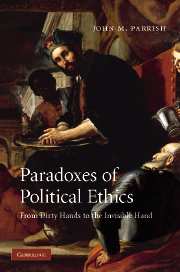Conclusion
Published online by Cambridge University Press: 22 September 2009
Summary
“Dirt's a funny thing,” the Boss said. “Come to think of it, there ain't a thing but dirt on this green God's globe except what's under water, and that's dirt too. It's dirt makes the grass grow. A diamond ain't a thing in the world but a piece of dirt that got awful hot. And God-a-Mighty picked up a handful of dirt and blew on it and made you and me and George Washington and mankind blessed in faculty and apprehension. It all depends on what you do with the dirt …”
Robert Penn Warren, All the King's MenThe history of philosophical reflection about dirty hands in public life is necessarily also the story of conflicts and tensions among large systems of values. The idea of value conflict and the plurality of values has been a major theme in contemporary moral philosophy and political theory, but the history of the concepts involved has yet to receive anything like a systematic examination. The preceding chapters have sought to trace the development over time of one of the most prominent problems connected to value pluralism: the question of the distinctive moral dilemmas associated with political action.
- Type
- Chapter
- Information
- Paradoxes of Political EthicsFrom Dirty Hands to the Invisible Hand, pp. 259 - 269Publisher: Cambridge University PressPrint publication year: 2007



